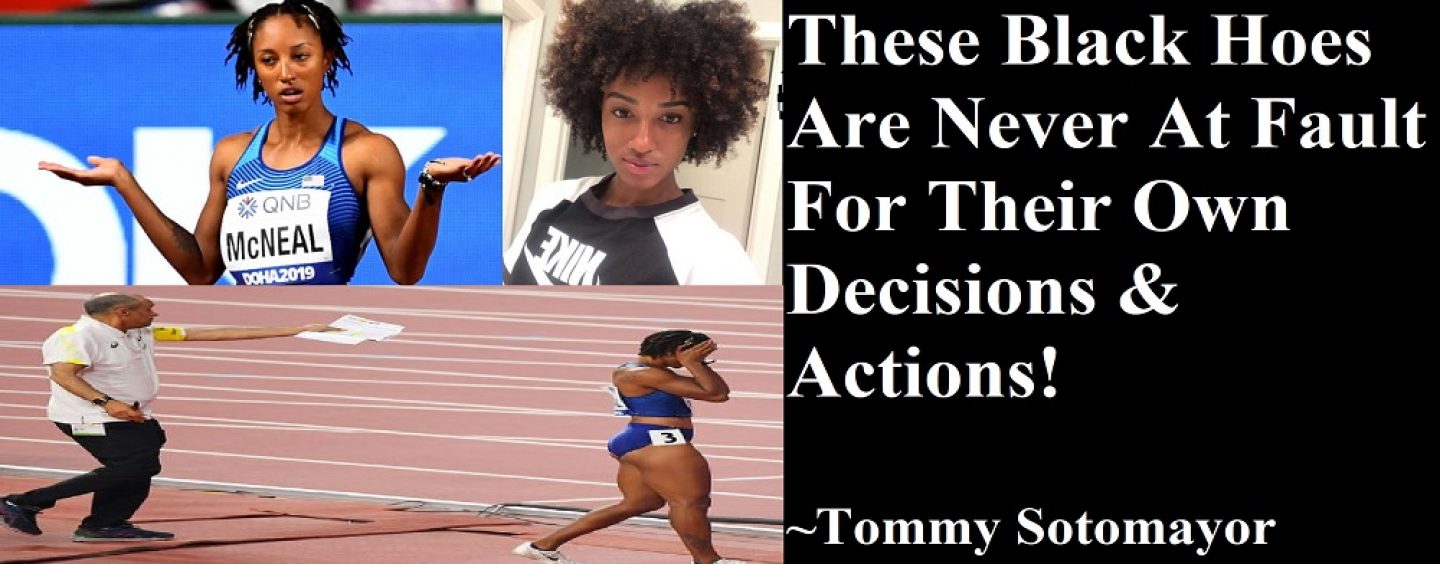
Brianna McNeal, Has Abortion Just To Make Olympic Team, Misses Drug Test But Blames White Supremacy! (Live Broadcast)
by Tj Sotomayor July 6, 2021 0 commentsIts Never Their Fault!
By: Tommy “Tj” Sotomayor
Why Brianna McNeal was banned from Tokyo Olympics

Brianna McNeal has been banned from participating in the Olympics for the next five years.
An Abortion, a Missed Drug Test and Altered Records Add Up to Trouble
Brianna McNeal said she didn’t open her door to antidoping officials because she was traumatized after having an abortion. On Friday, a court upheld her five-year suspension.

By Juliet MacurPublished July 1, 2021Updated July 3, 2021
Brianna McNeal, the 2016 Olympic champion in the 100-meter hurdles who last month qualified for her second U.S. Olympic team, never thought she would tell anyone but her husband and her spiritual adviser about the abortion she had in January 2020. Certainly not World Athletics, the global governing body of track and field. Definitely not the public.DON’T MISS A MOMENT AT THE TOKYO OLYMPICS: Sign up for our daily email update with the biggest highlights, the latest medal count and the stories you won’t see on TV.Sign Up
When interviewed after she qualified by finishing second in the Olympic trials final, McNeal said cryptically: “I want to cry right now. You guys don’t understand how much I’ve been going through this year. I’m just very emotional.”
But over two interviews this week, McNeal offered her first public explanation, saying she felt compelled to divulge the personal information in order to fight a doping ban and to clear her name.
Last month, McNeal, 29, was suspended for five years for “tampering within the results management process” in connection with her missing a doping test two days after she had the abortion. McNeal said she was in bed recovering from the procedure and did not hear the antidoping official arrive at the front door of her home in Northridge, Calif.Sha’Carri Richardson, a Track Sensation, Tests Positive for MarijuanaJuly 1, 2021
In a decision released on Friday, the Court of Arbitration for Sport in Switzerland upheld her five-year ban, meaning that McNeal will not have the chance to defend her Olympic title and will miss the next two Summer Games. The court said it would render a detailed decision later. It also added yet another penalty to her ban: McNeal is now disqualified from all events from Feb. 13, 2020 to Aug. 14, 2020, and should give up all medals, prizes and money won during that time.
- Dig deeper into the moment.
Gabbi Cunningham, who finished fourth in the 100 hurdles at the U.S. trials, will take McNeal’s place in Tokyo.
“Right now I feel excommunicated from the sport itself and stigmatized, and to me it is unfair,” McNeal said in a video call before her appeal was denied. “I just don’t believe that this warranted a suspension at all, much less a five-year suspension, for just a technicality, an honest mistake during a very emotional time.”
Of the sport’s antidoping authorities, she added: “They say that they are protecting athletes that are clean, but I don’t feel protected at all. I just feel like I’m being judged for this very big decision I made that really affected my life.”
World Athletics did not immediately respond to a request for comment.
The five-year suspension followed a yearlong ban McNeal received four years ago for missing three tests in a 12-month period. In that case, she said she twice forgot to update her whereabouts in the system that tracks athletes for random testing. On a third occasion, she said, she made a mistake entering the time when she would be available.
McNeal said she was coming forward to discuss the abortion now because she wanted people to know that the current suspension did not involve anything like tampering with a urine sample. She said she is “not doping and will never dope.”
McNeal’s case highlights the question of how much antidoping authorities do — or should do — to catch athletes who use banned drugs, while still protecting the rights of athletes who are clean.
The antidoping rule book is getting thicker and more nuanced, making it more complicated for clean athletes to follow every rule. Drug-testing technology has grown more sensitive, meaning that small traces of banned drugs — perhaps ingested by consuming tainted food — show up in results. Yet athletes and their handlers continue to offer outlandish excuses for missing or failing drug tests, making it tough for antidoping authorities to ease up on any part of their quest to keep sport clean.
The Russian high jumper Danil Lysenko’s excuse for missing tests, for example, was that he was undergoing medical tests at a hospital when the drug tester was looking for him. In the end, the doctors’ names on the paperwork submitted in his defense turned out to be fake and the hospital itself did not exist. Other cases, though, are complicated and antidoping officials must decide how strict they will be in the application of the rules, if the point is to catch athletes who intentionally cheat.
“No one wants a paperwork violation or other mistake to prevent a clean athlete from achieving their dreams,” said Travis Tygart, chief executive of the United States Anti-Doping Agency, adding that he is not involved in the McNeal case and hasn’t seen detailed documentation of it.
In recent years, some antidoping authorities have shown they will search for even a crumb of wrongdoing, even if the violation doesn’t prove the athlete was doping. The fairness of it is debatable, especially when an athlete has made what is clearly a mistake.
McNeal has not been accused of doping. Several flaws in the documentation she submitted to prove that she had an abortion are the reason for her ban.
On Jan. 12, 2020, a drug tester knocked on McNeal’s door but got no answer. Nor did anyone answer her phone. Eighteen days later, the Athletics Integrity Unit, which investigates doping in track and field, asked McNeal to explain. She was not required to answer. She had missed only one test in a 12-month period, and it takes three to trigger a doping violation.
McNeal said in the interviews this week that she wanted to be transparent with the investigators, so she explained that she had undergone “a surprise medical procedure” that had left her medicated and in bed. Wishing to protect her privacy, she did not give more details. But she requested a doctor’s note from the abortion clinic confirming an unnamed medical procedure.
When the note came about a month after the abortion, McNeal said, she mistakenly thought the clinic got the date of the procedure wrong. So she changed the date from Jan. 10, 2020, two days before her missed drug test, to Jan. 11.
The Athletics Integrity Unit noticed the change and asked for further documentation. McNeal submitted two more notes from the same doctor, changing the date on both of them. Investigators saw that and asked for her medical records from the clinic. McNeal sent the documents to prove she wasn’t lying about the procedure. Investigators then saw that the date of the procedure was, in fact, Jan. 10, and that she had terminated a pregnancy.
“I tried to keep the abortion private, but they just kept tugging and tugging at me, wanting more information,” McNeal said. “I couldn’t believe that I was charged with a violation because I had the dates mixed up by just 24 hours. It’s not like the procedure didn’t happen.”
World Athletics argued in a disciplinary hearing that McNeal should have known better than to alter the notes without confirming the date of the procedure with the clinic.
In its case against her, McNeal said, World Athletics said it didn’t believe she was so traumatized by the abortion that she got the date of the procedure wrong. After all, the organization said, she continued to post on social media and compete in the weeks afterward.
McNeal said investigators had chastised her for seeing a spiritual adviser instead of a psychiatrist while she was suffering from depression after the abortion.
“I told them, ‘Oh, really? For me, growing up in the Black community, that’s how we cope with everything — we go to church and we talk to our pastor or spiritual adviser,” she said. “I just feel like they have not been compassionate at all.”
McNeal said that as a Christian, she felt guilt about the abortion, which she underwent so she could compete in the 2020 Games. She said she was even more crushed when the Games were postponed until 2021, because the delay meant she could have had the baby after all.
McNeal had been so shaken and disoriented by the abortion, she said, that it didn’t occur to her that changing the date would be a bad thing.The Doping Problem
Howard Jacobs, one of her lawyers, was taken aback that the Athletics Integrity Unit brought a tampering case against McNeal when it easily could have backed down based on the sensitivity of the circumstances. He said the track and field federation had been more aggressive than any other federation in pursuing these kinds of cases.
“The question is how far do you go and how much is reasonable,” Jacobs said. “This case leaves a really bad taste in my mouth because they didn’t have to go forward with it. I have a really hard time with that.”
Brianna McNeal has been banned from participating in the Olympics for the next five years.
According to NBC Sports, McNeal, the 2016 Olympic champion in the 100-meter hurdles, missed a drug test in January 2020, reportedly because she was on bed rest recovering from an abortion. Anti-doping officials reportedly went to her residence and called her, but no one answered. That’s when the officials labeled her absence as “tampering with part of a doping control process.” The World Athletics agency then placed her on a five-year ban.
McNeal was allowed to compete last month in the U.S. Olympic trials in Eugene, Oregon, while she appealed the ruling. However, on Friday, July 2, the Court of Arbitration for Sport in Switzerland dismissed her appeal and further stated in its ruling that “all competitive results” McNeal obtained between Feb. 13, 2020, and Aug. 14, 2020, “shall be disqualified with all resulting consequences including forfeiture of any medals, titles, points, prize money and prizes.”
McNeal had finished second in the 100-meter hurdles at the Olympic trials, but now the fourth-place finisher, Gabbi Cunningham, is in line to be named to the U.S. team that will compete in Tokyo. McNeal is the second sprinter to have to sit out the Toyko Olympics. On Friday, July 2, Sha’Carri Richardson accepted a one-month suspension after she tested positive for marijuana.
McNeal responded to the ruling in a lengthy Instagram post. “I sat through two hearings [sic] one held April 2021 and July 2021, and listened to white European men tell me how my experience doesn’t match their perspective,” she wrote. “They criticized me, and overly judged my decision making, completely ignored the fact that I was under physical and mental trauma after undergoing an abortion, and that I was not in the right mental capacity when making decisions. They never expressed any sympathy with my situation.”
McNeal wrote that, during the second hearing, officials also brought in a clinical psychiatrist. “I watched them try to discredit the doctor we used to testify about abortion stigma,” she continued. “I couldn’t stop thinking to myself, ‘how could these men tell me what type of experience I should have had; how could these men who would never in a million years be in my shoes tell me anything I should be going through’?”
Later in McNeal’s statement, she wrote that she is a clean athlete and has never taken any banned substances but is “being treated like one of the worst dopers out there.”
She added: “To be clear: I have been tested no less than 70 times, including the three days after this missed test (and at the Olympic Trials) and have never tested positive. I am being excommunicated from the sport as if I was shooting up drugs my entire career.”







No Comments so far
Jump into a conversationNo Comments Yet!
You can be the one to start a conversation.Only registered users can comment.